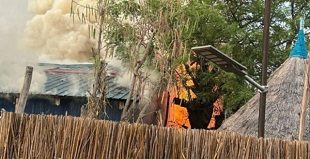Sadly, many African ‘intellectuals’ do not even understand what citizenship means and its role in the evolution of a modern democratic state. Our grasp of democratic theory is superficial ‘ that is why debate on the future of Rwanda is reduced to a single issue ‘ press freedom. Yet Kagame is actually building a modern state in Africa while most of his contemporaries are busy sustaining neo-patrimonial rule.
Africa’s primary need is to build public institutions that can act impersonally to ensure universal equal treatment of its peoples. When people kneel before the powerful to get fees for their children or medical attention, what you have are not citizens but clients; they get favours not rights. The consequences of this system are obvious; the political marketplace has voters auctioning their rights and politicians buying them as votes. This travesty of democracy is all too often ignored.
Rwanda is stepping away from this farce. The need for security and legitimacy through economic growth and public goods and services delivery has imposed a strong revenue imperative on the RPF. It needs money in circumstances where RPF is sceptical of the international community. It seeks economic growth at home by promoting trade abroad.
This strategy also has powerful implications for Rwanda. Kagame understands that given its lack of natural resources, Rwanda can only sustained growth by huge investments in education and the spread of Information Technology; and promoting investment at home. These efforts will inevitably produce constituencies whose desires will inevitably conflict with those of the RPF.
Paradoxically, the RPF is also building the most promising foundation for press freedom in Rwanda, albeit inadvertently. Rwanda has the highest density of fibre optic cables of any country in the third world. With the program of giving every child a laptop and spreading computer use to the far reaches of the country, the RPF is actually creating the opportunity for mass based internet usage.
In a decade, the government will lose control on communication as young internet savvy Rwandans will turn to the web to debate politics beyond the control of the state. Karl Marx observed that for the bourgeoisie to accomplish its project of accumulation, it inevitably produces a class (the proletariat) whose interest conflict with its own. Marx called it the ‘grave-digger problem’ and projected violent revolution.
RPF faces a similar dilemma grave digger problem. But Marx was wrong to see only a zero-sum struggle between capital and labour. Except for Tsarist Russia, the rest of Europe actually grew to accommodate labour demands without resort to violent revolution; that is how modern democracy was born. Non-zero-sum bargains always happen and RPF strategists should to begin thinking how to manage the tensions that will result from the social transformation they are promoting.
My point is that it is misleading to focus on the immediate actions of the RPF government in seeking to understand Rwanda’s future. Rather, we should be examining the consequences of Kagame’s policies on the interplay of emergent social forces. This is the history of democracy ‘ an insight best captured by Charles Tilly’s majestic paper, whose grist is captured by its title ‘War Making and State Making as Organised Crime.’
 The Independent Uganda: You get the Truth we Pay the Price
The Independent Uganda: You get the Truth we Pay the Price



